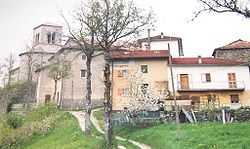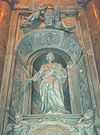Romanoro
| Romanoro | |
|---|---|
| Frazione | |
 | |
 Romanoro | |
| Coordinates: 44°18′38″N 10°31′26″E / 44.31056°N 10.52389°E | |
| Country |
|
| Region | Emilia-Romagna |
| Province | Modena (MO) |
| Comune | Frassinoro |
| Area[1] | |
| • Total | 14 km2 (5 sq mi) |
| Elevation[1] | 700 m (2,300 ft) |
| Population (2001)[2] | |
| • Total | 54 |
| • Density | 3.9/km2 (10.0/sq mi) |
| Demonym | Romanoresi |
| Time zone | CET (UTC+1) |
| • Summer (DST) | CEST (UTC+2) |
| Postal code | 41040 |
| Dialing code | 0536 |
| Patron saint | Scholastica, Benedict of Nursia[3] |
| Website | Official website |
Romonoro is a small hamlet (about 245 inhabitants in Winter, 740 inhabitants during Summer holiday, in the entire frazione)[4] in the province of Modena in central Italy, administratively a frazione[5] of Frassinoro. It is about 700 metres (2,300 ft) above sea level.
Romanoro houses a dairy facility.[6] Right below the town flows the Dolo mountain stream. A dam exists at the top of Fontanaluccia, that deviates part of the water about 16 km (9.9 mi) downward to the hydroelectric power plant located in the nearby Farneta.
History

by Bernini in the Saint Peter's Basilica (Rome).
First official documents mentioning the village date back to 1204 as Armanorium. In fact the "Armanorium" term can be traced back up to the presence of Arimanni (800 AD), Lombard soldiers to whom were given estates and lots in strategic territory with both agricultural and defensive purpose.
Once the Lombard Kingdom of northern Italy was conquered by Charlemagne, the whole Dolo valley was given in administration to medieval Rubbiano settlement; it remained to the latter until 1071, when local ruler Beatrice of Lorena, mother of Matilda of Tuscany, gave the Dolo valley in administration to the Frassinoro Hospice, thus creating by then the Frassinoro Benedictine Abbey.
At the beginning of the 14th century, together with Morsiano and Fontanaluccia, it was part of the Muschioso stronghold, administrated by the Lords of Dallo. According to the 1315 census, Cerreto, Panigale and Montale villages were part of the Romanoro comune. The Dallo were followed by the Montecuccoli family, that hold the Badia land until 1426, when they were replaced by the Estensi of Montefiorino (a branch of whom was Duke of Modena and Reggio). At the beginning of the 16th century the mountains were ravaged in the course of the war between the House of Este and the Papal States.[6]
Roads
A bridge over the Valoria landslide(44°19′22″N 10°32′11″E / 44.32278°N 10.53639°E)[7] has been opened the 14th of November 2009[8][9] Construction of a bridge over this landslide had been planned to start in 2006,[10][11] and it has been finished in November 2009.
Images
-
Romanoro - Cerreto
-
Romanoro - 1964 circa
See also
References
- ↑ 1.0 1.1 Romanoro ed il Tartufo, Comune di Frassinoro. (The figure for elevation is stated to be approximate. That for area is also approximate, and probably does not correspond to the boundaries used by istat for the 2001 census.)
- ↑ Popolazione residente - Modena (dettaglio loc. abitate), 2001 census, Istat.
- ↑ Terre della Badia, Comune di Frassinoro.
- ↑ "2001 Census of the province of Modena".
- ↑ "Romanoro frazione's area" (in Italian).
- ↑ 6.0 6.1 "About Romanoro's history, art, culture and dairy" (in Italian).
- ↑ See "Galleria Foto Lupi della Valle: Frana di Valoria". for photographs of the landslide.
- ↑ Bridge over the Valoria Landslide The opening of the Valoria Landslide Bridge(italian)
- ↑ [http://ilrestodelcarlino.ilsole24ore.com/modena/cronaca/2009/11/14/260560-inaugurato.shtml. Local Newspaper Website] Grand Opening of the bridge over this landslide (italian)
- ↑ Bridge over the Valoria Landslide Province of Modena (italian)
- ↑ Bridge over the Valoria Landslide Local Newspaper article 29 September 2007 (italian)
External links
| Wikimedia Commons has media related to Romanoro. |
- "Storia Cultura e Tradizione: Romanoro Cenni Storici" (in Italian).
- "Lupi della Valle" (in Italian).

